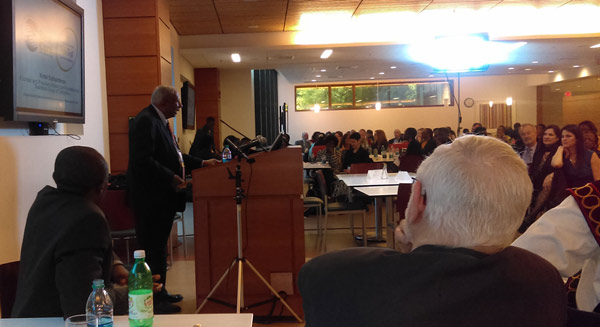BY INNOCENT CHIA from Boston for DUNIA Magazine
Two days and over 18 hours of serious and significantly important presentations and discussions at the 2016 Global Health Catalyst Cancer summit were more than anyone needed to be jolted to the urgency of now in the fight against Cancer. The April 29th – 30th event, at the Dana-Farber Cancer Institute at Harvard in Boston-Massachusetts, was an interdisciplinary meeting place of passionate minds and professionals who are racing for solutions to a scourge that devours life with time – cancer. In spite of remarkable scientific progress in cancer research and treatment, the growing numbers of new cases is a daunting reality. Participants at the annual summit inescapably had to answer the question whether to go at it alone and faster, or go together with other stakeholders and go farther?
With a crisp lay of the land, colored by irrefutable scientific data, Vanessa Kerry M.D, founder and CEO of the Seed Global Health, not only painted a picture of why there continues to be two standards of care between the haves and have-nots globally, she particularly identified push and pull factors, including brain drain, education and leadership gaps that must be reversed in any earnest conversations or actions seeking to redress challenges in Africa and other developing parts of the world.
Strident testimonies from cancer survivors, like that of Ms Asante Kwanele of the Ministerial Committee on the Prevention & Control of Cancer in South Africa, harped on the need for affordable remedies, particularly in most of Africa where people live on less than a dollar a day. In addition to the challenge of high costs, she said, access to treatment centers is yet another handicap for patients and their families that often travel from far and wide. It was an experience that Esther Ikiara of Mombasa, Kenya was all too familiar with. She lost her husband to Cancer, and she shared their many sojourns out of Kenya to seek medical attention. Aside from the emotional toll of leaving their kids for long stretches of time to family members, she said the financial burden was excruciating. On the heels of the death of her husband, Esther committed herself to a vision of a non-for-profit Cancer Center in Mombasa that would provide services at most affordable rates. It was one of several testimonies where the need for action was prompted by personal suffering and or loss.
But not so for Dr. Doyin Oluwule. Passionate in her own right, the CEO of Global Health Innovations & Action Foundation appealed for practical and achievable action steps. For instance, she said, her organization believes that the 1.2 million women between the ages of 15-44 in Liberia can be cervical cancer free if there is the will power to achieve such an important milestone. And it was a point that Dr Ophira Ginsburg totally agreed with. Appointed by the World Health Organization (WHO) in 2015 to guide (matters regarding) women’s cancer, Dr Ginsburg said it is very possible to eliminate, not eradicate, the prevalence of Cervical Cancer among women in the very near future with the HPV vaccine. Again, it is a matter of allocating the appropriate resources – human, infrastructural, financial.
For organizers of the Conference, the Global Health Catalyst Cancer Summit and its indispensable coordinator, Wil Ngwa PhD, immediately palpable outcomes were numerous.
Win-win collaborations and partnerships were established between some cancer centers in Africa and equipment manufacturers. A relationship was forged between a patient of the rare Chronic Lymphoctic Leukemia (CLL) and a specialist who was happy to be a second set of eyes and sounding board. The multiplicity of such partnerships, including with passionate investors like Krishnan Suthanthiran, the President and Founder of the Best Medical group of companies who lost his father to cancer as a young man, could speed up research, enable advocacy, foster education, reduce costs with new technologies…and assist in capacity building, especially while working with organizations such as Africans in the Diaspora (AiD) or Medical Physicists in the Diaspora for better Cancer Care in Africa (Mephida) that have on the ground operations on the continent.
Other win columns for the organizers included a partnership with celebrity athlete cancer advocates and an action sub-committee that participants of African descent set up to assist Global Health Catalyst Cancer Summit organizers. In the words of Dr Melvin Foote of the Constituency for Africa (CFA) “it is imperative to stop agonizing and start organizing”.
Another featured guest @GHealthCatalyst, Innocent Chia
Editor In Chief, DUNIA Reader’s Mag.https://t.co/IFaFKyYpzY pic.twitter.com/Hpo0GoQaJU— GlobalHealthCatalyst (@GHealthCatalyst) April 16, 2016
Join mailing list for updates and monthly newsletters

